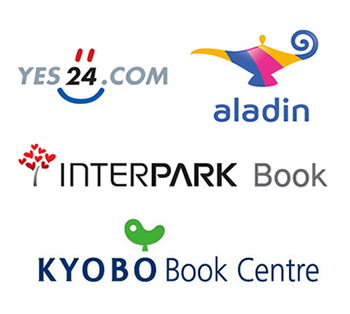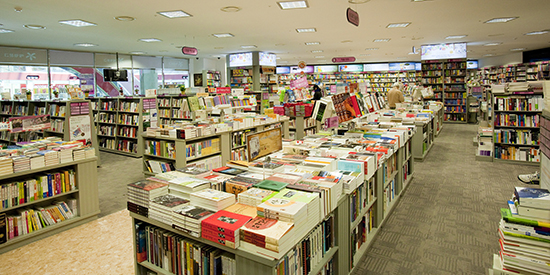|
South Korea's Major Online Bookstores
2017.12.01
Online bookstores account for 30 percent of South Korea's total book distribution and sales. The largest bookstore companies of this kind include YES24, Aladin, Interpark and Kyobo Book Centre, which has a large offline base. They are the 'Big 4' and when including offline sales, Kyobo dominates, but when talking about just online book sales, YES24 is the current leader.
After ‘Amazon.com’ emerged in the United States in 1995, global online book sales surged sharply and in South Korea, the first online bookstore appeared in 1997. Shortly after in the early 2000s, several more online bookstores entered the foray that had no offline base or store. Their growth over the following decade was astonishing. In 2009, sales reached an aggregate 1 trillion won before peaking in 2011. Internet bookstores have since shown fluctuation in sales repeatedly and this is where some explanation is needed.
South Korea's vague fixed-price policy on books is deeply intertwined with how online bookstores have grown and survived in South Korea. South Korea's fixed-price book policy that became mandatory in 2003 to prevent excessive discounts by online bookstores did not have much of an impact until Nov. 2014 when the amended version of the law came into effect. Before then, books that were more than 18 months old from their publishing date had been subject to unlimited discounts(including buy one get one events) and as a result, the stability of the entire publishing market became flawed as books on discount surged in popularity at odd times, reaching bestseller lists. During this time, online bookstores expanded their market share aggressively while smaller bookstores in regional locations were forced out of the market, unable to compete. At this time, the market size did not show much change, while online bookstores saw rapid growth.
From Nov. 2014, all books became subject to a discount cap of 15 percent, and while online bookstores managed to squeeze in some sales growth with 'final discount' events towards the end of 2014, sales on a whole slowed in growth in 2015. In 2016, book sales growth picked up, but largely due to bookstores turning their focus on the secondhand book market after the discount cap was enforced.
South Korea's online bookstores have a high market share while they offer a number of services like 'same day delivery' and discount marketing tools that are still usable under the current law. They also sell e-books and secondhand books. After opening its online doors in 2008, Aladin, known for its secondhand book sales, now has 40 offline stores for secondhand books in major cities nationwide after the first one was established in 2011. The company has stuck to selling secondhand books as offline book sales have been designated as an SME-appropriate business(valid until Feb. 2019). YES24 also has six offline stores for secondhand books in Seoul and Busan. The large online bookstores mentioned in this article currently say they have a business margin of 10 percent from their open market sales where individual participants buy and sell books to and from each other. The companies also separately sell and buy used books. At times, they fall under blame from South Korean publishers who rely on sales of new publications in order to survive.
What is particularly a problem is their buyback marketing. Online bookstores currently ensure individuals will get half of their money back if they buy bestsellers or new publications from them and sell it back to them later. After some demand from publishers, online bookstores have established a rule where this buyback program can be used only if the book is six months or older past publication. This type of marketing has driven a surge in secondhand books while suppressing sales of new publications and benefiting online bookstores at the same time. Many offline bookstores complain these buyback programs and the expansion of online secondhand bookstores in the real world have hurt business.
After starting their businesses online, these major online bookstores have now expanded their reach to actual sales while also serving as platforms of e-books and other digital content. They have been able to meet the demands of customers by providing quickly searchable databases and swift delivery. They have also modernized ways of doing business with publishers, but have not been able to avoid criticism for solely focusing on boosting sales through discounts, the abnormal expansion of the secondhand bookstore industry and lower distribution rates from small and or new publishers(aimed at expanding their margins). South Korea is one of the few key countries in the world where Amazon.com has not yet launched. However, what the online bookstores see now is similar to what Amazon is facing overseas in terms of criticism over its high market share and tax evasion while enjoying massive brand power.
Under South Korea's current fixed-price book policy, online bookstores benefit the most. They provide 10 percent discounts topped with another 5 percent dubbed as 'mileage discounts' made possible through their direct trade with publishers. They also use their influence in the distribution system to boost their online exposure, related goods sales and other marketing programs. Some of them also engage in sales of other diverse goods like travel packages, performance tickets and commercial goods, making it impossible for offline bookstores that rely solely on the sales of books to compare. However, the large online bookstores are also constantly at conflict with themselves to overcome the limits seen in book sales overall.
Written by Won-keun Baek (President, Books & Society Research Institute) Won-keun Baek (President, Books & Society Research Institute) |
||||
Pre Megazine
-

Export Prospects of Korean Books
VOL.1
2017.06 -

Current State of Korean Publishing
VOL.1
2017.06 -

Korean Bestsellers Trend in June
VOL.1
2017.06 -

Export Prospects of Korean Books
VOL.2
2017.07 -

South Korea's publishing industry
VOL.2
2017.07 -

South Korea's July Bestsellers
VOL.2
2017.07 -

Export Prospects of Korean Books
VOL.3
2017.08 -

South Korea's digital publishing industry
VOL.3
2017.08 -

South Korea's August Bestsellers
VOL.3
2017.08 -

Export Prospects of Korean Books
VOL.4
2017.09 -

Changes in South Korea's reading demographics
VOL.4
2017.09 -

South Korea's September Bestsellers
VOL.4
2017.09 -

Export Prospects of Korean Books
VOL.5
2017.10 -

South Korea's Printing Industry
VOL.5
2017.10 -

South Korea's October Bestsellers
VOL.5
2017.10 -

Export Prospects of Korean Books
VOL.6
2017.11 -

South Korea's Key Publishing Related Organizations
VOL.6
2017.11 -

South Korea's November Bestsellers
VOL.6
2017.11 -

Export Prospects of Korean Books
VOL.7
2017.12 -

South Korea's Major Online Bookstores
VOL.7
2017.12 -

South Korea's December Bestsellers
VOL.7
2017.12 -

Export Prospects of Korean Books
VOL.8
2018.01 -

South Korea's budding publishing experts
VOL.8
2018.01 -

South Korea's January Bestsellers
VOL.8
2018.01 -

Guadalajara Book Fair 2017 Book from Korea
VOL.8
2018.01 -

Export Prospects of Korean Books
VOL.9
2018.05 -

South Korean Government Policies to Shore Up the Publishing Industry
VOL.9
2018.05 -

South Korea's April Bestsellers
VOL.9
2018.05 -

Overseas Publication Grants
VOL.9
2018.05 -

Overseas Publication Grants
VOL.10
2018.06 -

Aggregate data as of the fifth week of May
VOL.10
2018.06 -

South Korea’s Digital Publishing Contents Platform
VOL.10
2018.06 -

Export Prospects of Korean Books
VOL.10
2018.06 -

South Korea's June Bestsellers
VOL.11
2018.07 -

Overseas Publication Grants
VOL.11
2018.07 -

South Korea’s Library Status
VOL.11
2018.07 -

Export Prospects of Korean Books
VOL.11
2018.07










